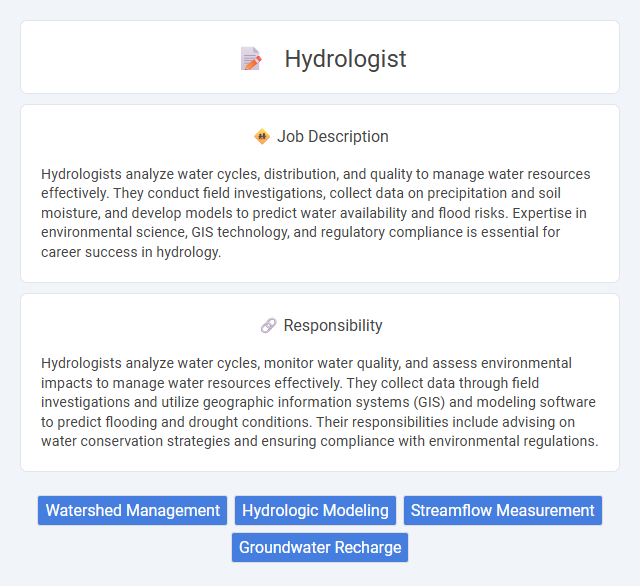
Hydrologists analyze water cycles, distribution, and quality to manage water resources effectively. They conduct field investigations, collect data on precipitation and soil moisture, and develop models to predict water availability and flood risks. Expertise in environmental science, GIS technology, and regulatory compliance is essential for career success in hydrology.
People with strong analytical skills and a passion for environmental science are likely suitable for a hydrologist career. Those comfortable working outdoors and in various weather conditions may find this role particularly fitting. Individuals who prefer routine tasks or limited fieldwork might struggle with the demands of hydrology work.
Qualification
Hydrologists typically require a bachelor's degree in hydrology, environmental science, geology, or related fields, with many positions favoring candidates holding a master's degree for advanced research roles. Proficiency in geographic information systems (GIS), data analysis, and computer modeling is essential to analyze water cycle and distribution patterns effectively. Professional certification, such as the Certified Hydrologist (CH) credential from the American Institute of Hydrology, enhances job prospects and demonstrates specialized expertise in water resources management.
Responsibility
Hydrologists analyze water cycles, monitor water quality, and assess environmental impacts to manage water resources effectively. They collect data through field investigations and utilize geographic information systems (GIS) and modeling software to predict flooding and drought conditions. Their responsibilities include advising on water conservation strategies and ensuring compliance with environmental regulations.
Benefit
Hydrologists likely enjoy benefits such as contributing to water resource management and environmental protection, which can bring a strong sense of professional fulfillment. They probably receive competitive salaries and may have access to opportunities for fieldwork and research, enhancing job satisfaction. Job stability and the chance to work on critical issues related to climate change and natural disasters are also potential advantages.
Challenge
Hydrologists likely face the challenge of accurately predicting water resource availability amidst changing climate patterns and human impact. They probably need to analyze complex data to model flood risks and drought occurrences, which can be highly variable and uncertain. Managing these unpredictable environmental factors may require advanced technical skills and adaptive problem-solving strategies.
Career Advancement
Hydrologists can accelerate career advancement by gaining expertise in advanced data modeling, GIS technology, and climate impact analysis, which are highly valued in environmental consulting and government agencies. Pursuing certifications such as Professional Hydrologist (PH) or advanced degrees in hydrology or environmental science enhances credibility and opens leadership opportunities. Building a strong professional network through organizations like the American Geophysical Union (AGU) also facilitates access to higher-level projects and management roles.
Key Terms
Watershed Management
Hydrologists specializing in watershed management analyze water flow, quality, and distribution to develop sustainable conservation strategies. They utilize Geographic Information Systems (GIS) and hydrological models to assess watershed hydrodynamics and mitigate flooding or erosion risks. Their expertise supports environmental agencies and urban planners in managing water resources and protecting ecosystems within defined watershed boundaries.
Hydrologic Modeling
Hydrologists specializing in hydrologic modeling develop and apply mathematical simulations to predict the distribution, quality, and movement of water in natural and urban environments. Their work involves analyzing rainfall data, watershed characteristics, and land use patterns to forecast flooding, manage water resources, and design sustainable infrastructure. Advanced proficiency in Geographic Information Systems (GIS), remote sensing, and software like HEC-HMS or SWAT enhances accuracy in model calibration and scenario analysis.
Streamflow Measurement
Hydrologists specializing in streamflow measurement analyze river and stream discharge to assess water availability, quality, and flood risks. They employ techniques such as flow gauging, velocity-area methods, and remote sensing to collect accurate hydrological data. This information supports water resource management, environmental protection, and infrastructure planning.
Groundwater Recharge
Hydrologists specializing in groundwater recharge analyze the natural and artificial processes that replenish aquifers, employing advanced modeling techniques and field data collection to assess water movement and storage. They utilize Geographic Information Systems (GIS) and remote sensing technology to map recharge zones and quantify infiltration rates critical for sustainable water resource management. Their work supports the development of effective groundwater management policies, mitigating depletion risks and ensuring long-term water availability for agriculture, industry, and ecosystem health.
 kuljobs.com
kuljobs.com